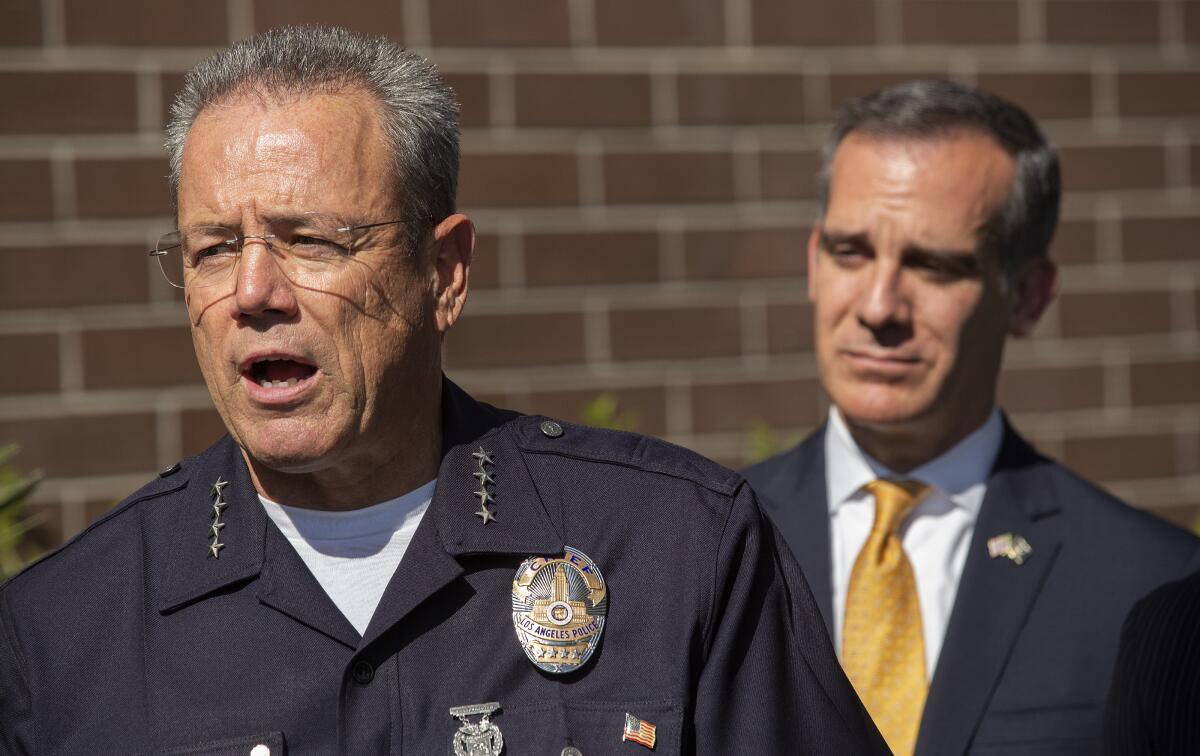L.A.’s ‘zero bail’ policy doesn’t increase crime but does reduce the devastating consequences of incarceration

- Share via
The pandemic pushed L.A. County to instate a “zero bail” policy, but our leaders are willfully denying the positive results.
Under the policy, individuals accused of low-level offenses are released while they await trial without having to pay bail. The zero-bail policy has saved lives since March 2020 and coincided with drops in property crime.
Law enforcement officials have predictably opposed zero bail, as they resist any reform that moves away from mass incarceration. LAPD Chief Michel Moore blasted the policy this month after a string of smash-and-grab thefts from stores. He said that “criminal elements” had been emboldened because pretrial jail had become less likely than it used to be. He seemed to lament that all 14 people arrested in connection with the 11 incidents had been released from police custody as they await trial.
But their releases aren’t entirely explained by the zero-bail order. If any were arrested for “serious” or “violent” offenses, like robbery (theft using force or fear), they would not be covered by zero bail and would have had the usual bail set. Moore himself said the suspects were released for various reasons: because they were juveniles, posted bail or met criteria for zero bail. Blurring that distinction helps Moore to make his case against a successful policy.
Mayor Eric Garcetti has joined the police chief in this distortion. “There are people who need to be behind bars,” he said. “We have opened up a lot of the city because we’re in a better place with COVID. We should be able to also open up our jails, and we should be able to have judges that put people behind those bars as well.”
Comments like those reveal that political self-interest builds up the practice of pretrial incarceration and undermines sensible reforms rooted in the collective desire for public safety. Community-based pretrial release does not increase recidivism; pretrial incarceration does. It exacts a high fiscal as well as human cost, shouldered by all taxpayers and especially by families, who are disproportionately from low-income communities and communities of color. People held on pretrial detention, often because they cannot afford bail, are presumed innocent because they have not been convicted of a crime. They may lose a job or a home or custody of a child, and some may even be pressured into pleading guilty just to get a plea deal that reduces jail time.
In March 2020 as COVID-19 spread in crowded jails and prisons around the country, L.A. County and court officials took necessary steps to reduce the jail population. It was a good idea then, and it still is. Yet now, Moore and Garcetti seem intent on scoring political points. The LAPD has taken the 14 arrests from the smash-and-grab thefts as an opportunity to advance an unrelated agenda focused on promoting pretrial incarceration.
A month after the zero-bail order went into effect, Moore publicly challenged the policy. He pointed out that people who had been released from custody made up 5% of recent arrestees, instead of 4% in the period a year earlier — a statistically insignificant difference. He did not take into account that at the time, overall arrests were down 37%, meaning that under the zero-bail order, fewer people were rearrested than had been before the zero-bail order. The minor increase in proportion of arrests hardly justifies ending a life-saving policy.
Such distortions are the standard playbook for sustaining mass incarceration and inflating police budgets. Law enforcement has also relentlessly vilified Proposition 47, which reclassified certain felony offenses as misdemeanors. Critics blame the 2014 state ballot initiative for increased crime and continue to call for its repeal. But in fact, Proposition 47 reduced recidivism rates. California saw no increase in violent crime and only small and brief upticks in property crimes after its passage, according to the Public Policy Institute of California. Similarly, in New York, law enforcement leaders blamed bail reform for a rise in shootings, even though police data revealed that the two were unrelated.
When asked after the smash-and-grabs whether thefts had increased overall, Moore pointed to an increase in car thefts, but otherwise avoided the question. Robberies in Los Angeles are down substantially from 2019, as are burglaries and property crimes there overall.
Researchers who have tracked bail reform policies have found that a zero-bail policy does not contribute to an increase in crime. In fact, there is ample evidence that pretrial incarceration increases the chances that a person will be charged with a new offense, because of the harmful consequences of incarceration, including loss of employment, separation from families and isolating individuals from their community.
Reducing pretrial detention is a worthwhile reform in any era, not only because of the pandemic, and the zero-bail policy should be continued.
Ambrose Brooks S. is the coalition coordinator of JusticeLA and a campaign coordinator at Dignity & Power NOW.
More to Read
A cure for the common opinion
Get thought-provoking perspectives with our weekly newsletter.
You may occasionally receive promotional content from the Los Angeles Times.









